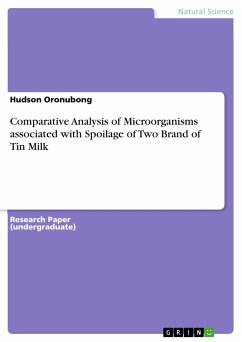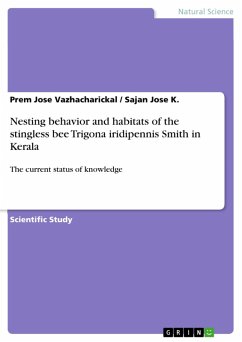
Marigold as an Effective Candidate in Nematode Control (eBook, PDF)
Sofort per Download lieferbar
Statt: 42,95 €**
29,99 €
inkl. MwSt. und vom Verlag festgesetzt.
**Preis der gedruckten Ausgabe (Broschiertes Buch)
Alle Infos zum eBook verschenkenWeitere Ausgaben:

PAYBACK Punkte
0 °P sammeln!
**Preis der gedruckten Ausgabe (Broschiertes Buch)
Master's Thesis from the year 2004 in the subject Biology - Parasitology, grade: First, Tamil Nadu Agricultural University, course: Plant Nematology, language: English, abstract: Nematodes are tiny, microscopic round worms which are subterranean in nature and affect almost all the agricultural crops and cause substantial yield loss to the farmers. Nematode management over years relied on chemical methods. Owing to the ill effects with the application of chemicals, ecofriendly methods are gaining importance now a days in nematode management. Marigold is an effective antagonistic plant against n...
Master's Thesis from the year 2004 in the subject Biology - Parasitology, grade: First, Tamil Nadu Agricultural University, course: Plant Nematology, language: English, abstract: Nematodes are tiny, microscopic round worms which are subterranean in nature and affect almost all the agricultural crops and cause substantial yield loss to the farmers. Nematode management over years relied on chemical methods. Owing to the ill effects with the application of chemicals, ecofriendly methods are gaining importance now a days in nematode management. Marigold is an effective antagonistic plant against nematodes. The plant, by the production of alpha terthienyl bithenyl compounds from its roots, repel the nematodes and reduce its population. Understanding the mechanism involved in the antagonistic nature of the plants will result in the better enhancement of the nematode management practices in an environmental friendly approach. Tomato (Lycopersicon esculentum Mill.) is the most important solanaceous vegetable. In India, it is produced around 1, 75, 00,000 MT/ha. Lycopene, an antioxidant is the primary product of tomato, which gives colour to the fruit and protects humans against cancer and heart diseases. Moreover the fruit is also rich in Vitamin A and C. Among the yield reducing factors in tomato, root knot nematode, Meloidogyne incognita is the only species known to cause economic damage and often happens to be the major limiting factor in the successful cultivation of tomato (Lycopersicon esculentum Mill.) In affected roots, the functional root system gets modified to galls and it impairs the uptake of water and nutrients. Poor development of root system makes the plant highly susceptible to drought. The entire root system may be shallow with excessive branching.
Dieser Download kann aus rechtlichen Gründen nur mit Rechnungsadresse in A, B, BG, CY, CZ, D, DK, EW, E, FIN, F, GR, HR, H, IRL, I, LT, L, LR, M, NL, PL, P, R, S, SLO, SK ausgeliefert werden.













